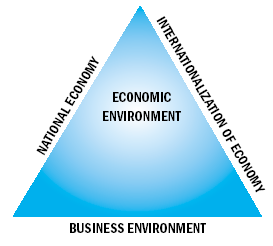The Economic Environment
The circular flow model of the economy
Title: The Economic Environment. The firms in this model are the businesses while the households are the consumers. The firm is responsible for the production function while the households are responsible for consumption. In his book Waste to wealth: The Circular Economy, Lacy Peter states that households in the circular flow model provide labor in exchange for payment and offer this payment in exchange for the goods and services produced. The circular flow model entails the government, consumer and business elements. The firm produces goods and services to meet the consumer demand. Households purchase these products and pay to the firms. Additionally, households also provide the labor necessary to produce the goods and services. Therefore, one cannot exist without the other. This is key to any economic environment.
The financial sector such as banks and micro finances are important to the Circular Flow Model of the economy in many aspects despite being greatly ignored. This sector is responsible for ensuring that money flows across the firms, households and the government. The financial sector allows households to save money gained from working in the firms.
This money is also used for investment purposes in factors such as the fixed assets used by the firms to produce goods and services. When the government and the households save, the money is directed towards the financial market. In order to ensure the continuance of the economy, financial sectors invest this money by lending it to the households, firms and the government hence making the flow continuous (Chand, 2016). This is critical to the economic environment. Furthermore, the financial sector determines the amount of money in the market hence the inflation rate at any one moment. The circular flow model of the economy would be incomplete without the financial sector.
Economic Environment and Gross Domestic Product (GDP)
The GDP of a nation is the total market value of goods and services produced in the nation. GDP is effectively measured through market prices. During different times, prices tend to change especially because of inflation. Therefore, comparing the nominal GDP over different times may not be helpful as comparing the real GDP of New Zealand’s economy. Instead, real GDP, also known as the GDP in constant prices may be used to compare the market value of goods and services. Real GDP helps compare the GDP during different periods at the same set of prices. While the nominal GDP is equal on both the production and expenditure sides, the real GDP differs on the production and the expenditure mainly due to changes in relative prices between imports and exports.

One statistic that should be considered when making an international investment or expansion is the Foreign Direct Investment (FDI) rate. By understanding the level of FDI in a foreign country, it is possible to establish how competitive the market in the foreign country is. One may also use the inflation rate of the country as well as the unemployment rate to determine how suitable the new market is for the expansion. The inflation rate determines how strong or weak the local currency is hence affecting the amount of money required for the initial investment. Additionally, constant changes in the rate of inflation may be an indication of an unstable economy. On the other hand, the rate of unemployment can help predict the potential demand and supply for the goods or services. The inflation rate may also help project the cost of labor for the new branch internationally.
The Business Cycles and Business The Environment
New Zealand’s recent annual GDP was 173.75 billion US dollars while the value stood at 0.28% of the global GDP. The GDP growth rate is at 2.50%. The inflation rate has been at a steady of 4.75% since 1918 to 2016. On the other hand, the unemployment has been at an average of 6.13% since 1985 to 2016. However, the rate of unemployment fell to 5.1% during the second quarter of 2016. Although the New Zealand economy has past the peak phase, it is expected to continue growing at a healthy rate while creating new jobs.
A housing bubble occurs when an increase in demand leads to a significant increase in the house prices (Roberts, 2008). Unlike most goods and services, replenishing the supply of houses takes time hence creating a bubble with soaring house prices. Eventually, the bubble bursts due to the increase in supply and a decrease in demand. Such an event would cause the New Zealand economy to slow down significantly.
When an economic recession occurs, the number or frequency of economic environment activities decline significantly (Roubini, 2011). Some businesses are able to continue operating as long as they are able to cover their fixed cost. However, other businesses not able to cover the variable cost including labor have to shut down rather than operate at zero profit. Scarcity of supply due to high production cost leads to high prices, meaning that consumers are unable to purchase goods and services. Firms selling second hand goods, companies dealing with bankruptcies or debt problem benefit during recession. The market is also more efficient and consumers get the best value in the market.
References
Chand, S. (2016). The Economic Environment and Circular Flow of Income in a Four Sector Economy.
Lacey, P. (2015). Waste to wealth: The Circular Economy and Economic Environment. Palgrave MacMillan.
Roberts, L. (2008). The Great Housing Bubble: Why did House Prices Fall? Monterey Cypress, LLC.
Roubini, N. (2011). Crisis Economics: A Crash Course in the Future of Finance. Penguin Books.
